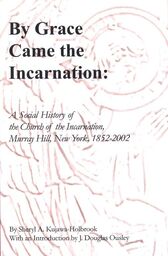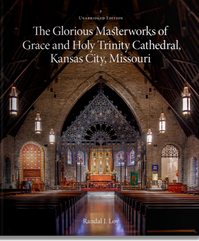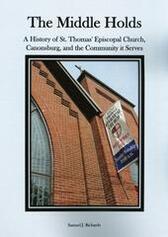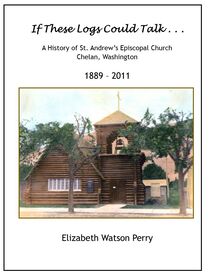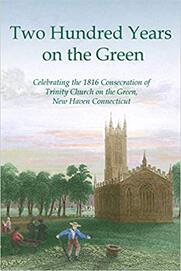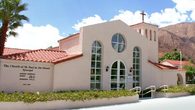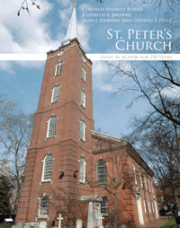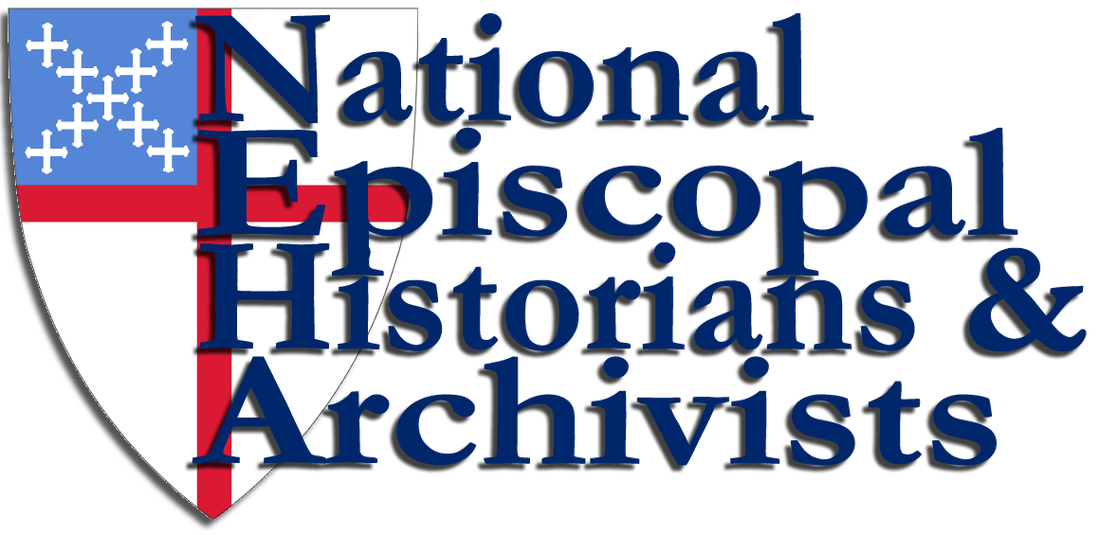Laurence D. Fish Parish History AwardThe Laurence D. Fish Parish History Award is made to the author or authors of an outstanding example of a parish history. Established in 2010 to honor Larry Fish, who had been the Diocese of New Jersey Archivist & Historiographer, long-time NEHA member and past president, and author of "Writing a Congregational History." Submissions are evaluated by a committee. The award is made every odd numbered year during the NEHA Annual Conference and includes a modest cash award. Guidelines used by the committee are found here.
|
The next award date has not been determined. |
2019 Recipients
.The 2019 Laurence D. fish Parish History Award was presented during the banquet of the Tri-History Conference 2019. The Committee decided on three levels of the award
|
Gold Award
Sheryl Kujawa-Holbrook By Grace Came the Incarnation’: A Social History of the Church of the Incarnation, Murray Hill, New York, 1852 – 2002. |
Silver Award
Randal J. Loy The Glorious Masterworks of Grace and Holy Trinity Cathedral, Kansas City, MO. |
Silver Award
Samuel J. Richards The Middle Holds, A History of St. Thomas’ Episcopal Church, Canonsburg, PA and the Community it Serves |
Bronze Award
Elizabeth Watson Perry If These Logs Could Talk... A History of St. Andrew’s Episcopal Church, Chelan, WA, 1889-2011 |
Committee members were Gloria Lund, Archivist for the Diocese of Spokane; Franklin Robinson, Archivist with the National Museum of American History, The Smithsonian, and author/historian; Peter Williams, University Distinguished Professor Emeritus, Comparative Religion and American Studies, Miami University of Ohio, and author/historian; Susan Witt, Archivist and Historian, Diocese of Western New York; and Phillip Ayers, Assistant Priest, Trinity Cathedral, Portland, Oregon and Book Editor for The Historiographer.
2017 RecipientsThe 2017 Laurence D. Fish Parish History Award was presented to the Rev. Robert L. Semes, author of A Church Grows in the Desert: A History of the Episcopal Church of St. Paul in the Desert, 1939-2014. Semes is a retired professor of history and religion and an Episcopal priest. This is the third parish history he has written. In 2014, both the City of Palm Springs and the Church of St. Paul in the Desert celebrated the 75th anniversary of their founding. Semes wrote the book to honor and mark the occasion of the church’s 75th anniversary. It can be purchased in the church office.
Receiving awards of merit were Franklin A. Robinson, Jr. author of Faith and Tobacco: A History Of St. Thomas' Episcopal Parish Prince George's County, Maryland and The Rev. Michael J. Tan Creti author of The Great Crowd: A Love Story About a Large Urban Parish.
|
2014 RecipientsThe 2014 Laurence D. Fish Parish History Award, this first to be awarded, was presented to St. Peter’s Church, Philadelphia, for St. Peter’s Church: Faith in Action for 250 Years. The authors were Cordelia Frances Biddle, Elizabeth S. Browne, Alan J. Heavens, and Charles P. Peitz. It was published by Temple University Press in 2011. Judges for all nine entries were A. Margaret Landis, G. Michael Strock, Peter W. Williams and Phillip Ayers.
Celebrating 250 years, St. Peter's Episcopal Church in the Society Hill neighborhood of Philadelphia, has witnessed a rich mixture of people and events that reflect critical periods of American political and cultural history. George Washington worshiped here as did abolitionists and slave holders, Whigs, Democrats, and Republicans. St. Peter's was a point of first contact for thousands of immigrants, and the church opened schools for immigrants to help them to acculturate to life in Philadelphia. Opening a window onto colonial Philadelphia and the nation's histories, a"St. Peter's Church"ais a glorious testament to this National Historic Landmark. In addition to the stories and hundreds of black-and-white and color photographs, this handsome volume provides a history of the grounds, the churchyard, and the church itself-a classic example of eighteenth-century Philadelphia design that later incorporated the work of renown architects William Strickland, Thomas U. Walter, and Frank Furness."
|
NEHA and The Rev. Canon Laurence D. Fish II
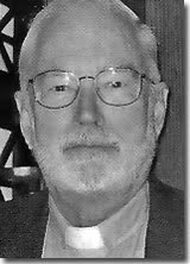 Canon Fish
Canon Fish
A post-script to an obituary published in the Historiographer, Summer 2010
In the brief account of his life, Larry quite humbly neglects to mention the profound influence he had on NEHA. As a person privileged to work with him on the staff of the Diocese of New Jersey, I witnessed first hand his commitment to the preservation of church archives. He was keenly interested in sharing his passion with others, and educating people on the treatment and use of archival material, as well as the writing of parish histories. He once said to me that he felt he had found his true calling when appointed Registrar and Historiographer of the Diocese of New Jersey.
His enthusiasm for church histories found another outlet with NEHA, where his energy and creativity were put to use in re-shaping the society. Larry served as treasurer from 1993-1996, and became president in 1996. Under his leadership, he increased membership and encouraged educational opportunities in dioceses, teaching them how to preserve their history and that of their congregations. In addition, NEHA established a series of professional publications that could be used at the parish level.
At the NEHA meeting in 1991, Stan Upchurch, archivist for the Diocese of Oklahoma, was commissioned to design a constitution and bylaws for NEHA. These were voted on and approved at the meeting in 1992. However, when NEHA needed to incorporate in Pennsylvania, new bylaws were required. Larry headed a planning committee, working with input from board members and guided by the chancellor of the Diocese of Pittsburgh, that produced the bylaws that were approved in 1999. With a few slight changes made since, these are the bylaws under which NEHA operates today.
Larry had a vision for the organization to become a force not only among diocesan historiographers, but to reach out to the volunteers who worked on both the diocesan and parish levels and to offer them training. He dreamt of regional workshops, the first of which were held in Connecticut and Massachusetts in 1998. He also wanted to offer printed guidelines.
His Writing a Congregational History made its debut at the General Convention in Minneapolis in 2003. Archives for Congregations made its debut at the General Convention in Columbus in 2006. Both have guided innumerable historiographers and archivists as they have grappled with their assigned tasks.
Although honored by NEHA in 2003 with the John W. Davis Award, NEHA has recently created the Laurence D. Fish Award in parish history to reflect Larry's profound contributions to the work of preserving the history of parishes. When told of the award shortly before his death, Larry responded with, "Why would they want to do a d...d fool thing like that." Despite his quip, Larry was deeply moved by the honor.
In the brief account of his life, Larry quite humbly neglects to mention the profound influence he had on NEHA. As a person privileged to work with him on the staff of the Diocese of New Jersey, I witnessed first hand his commitment to the preservation of church archives. He was keenly interested in sharing his passion with others, and educating people on the treatment and use of archival material, as well as the writing of parish histories. He once said to me that he felt he had found his true calling when appointed Registrar and Historiographer of the Diocese of New Jersey.
His enthusiasm for church histories found another outlet with NEHA, where his energy and creativity were put to use in re-shaping the society. Larry served as treasurer from 1993-1996, and became president in 1996. Under his leadership, he increased membership and encouraged educational opportunities in dioceses, teaching them how to preserve their history and that of their congregations. In addition, NEHA established a series of professional publications that could be used at the parish level.
At the NEHA meeting in 1991, Stan Upchurch, archivist for the Diocese of Oklahoma, was commissioned to design a constitution and bylaws for NEHA. These were voted on and approved at the meeting in 1992. However, when NEHA needed to incorporate in Pennsylvania, new bylaws were required. Larry headed a planning committee, working with input from board members and guided by the chancellor of the Diocese of Pittsburgh, that produced the bylaws that were approved in 1999. With a few slight changes made since, these are the bylaws under which NEHA operates today.
Larry had a vision for the organization to become a force not only among diocesan historiographers, but to reach out to the volunteers who worked on both the diocesan and parish levels and to offer them training. He dreamt of regional workshops, the first of which were held in Connecticut and Massachusetts in 1998. He also wanted to offer printed guidelines.
His Writing a Congregational History made its debut at the General Convention in Minneapolis in 2003. Archives for Congregations made its debut at the General Convention in Columbus in 2006. Both have guided innumerable historiographers and archivists as they have grappled with their assigned tasks.
Although honored by NEHA in 2003 with the John W. Davis Award, NEHA has recently created the Laurence D. Fish Award in parish history to reflect Larry's profound contributions to the work of preserving the history of parishes. When told of the award shortly before his death, Larry responded with, "Why would they want to do a d...d fool thing like that." Despite his quip, Larry was deeply moved by the honor.
Deborah Crall, A Margaret Landis, Lynne Wohleber
